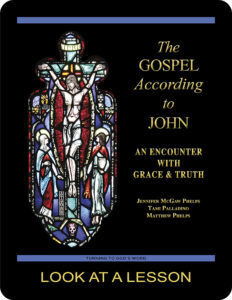light
 In reference to the light described in the prologue of the Gospel According to John, what does it mean that the darkness did not overtake it? In both the New American Bible Revised Edition (NABRE) and translations of the Revised Standard Version Catholic Edition (RSVCE and RSV2CE), the Gospel According to John 1:5 reads: “The light shines in the darkness, and the darkness has not overcome it,” a translation that loses much of the grammatical subtlety of the Greek phrase.
In reference to the light described in the prologue of the Gospel According to John, what does it mean that the darkness did not overtake it? In both the New American Bible Revised Edition (NABRE) and translations of the Revised Standard Version Catholic Edition (RSVCE and RSV2CE), the Gospel According to John 1:5 reads: “The light shines in the darkness, and the darkness has not overcome it,” a translation that loses much of the grammatical subtlety of the Greek phrase.
Before we can get to the passage at hand, it’s important to understand one distinction in ancient Greek grammar. Conjugated Greek verbs have a tense indicating time of the event (past, present, and future) as well as aspect (ongoing, simple, and completed) indicating the degree of completion or continuation of the event.
Let’s take a closer look at these three aspects. Ongoing aspect indicates that the event is or was ongoing. For example, the sentence “I am reading the Bible in Greek,” suggests that this is an action that is ongoing. Simple aspect indicates an event that is completed with no suggestion of continuing action, for example: “I translated the first chapter of the Gospel According to John from Greek.” This example suggests only that the event once occurred. Finally, completed aspect indicates an event that completed with ongoing results. For example: “I have been studying Greek for 11 years” suggests that the act of studying Greek has occurred and still is continuing.
Depending on aspect, there are three different past tenses in Greek. The imperfect tense suggests past time but continuing aspect: “During college, I was studying Greek daily.” The aorist indicates simple aspect: “I learned the Greek alphabet.” The pluperfect suggests a completed event with continuous aspect: “I had not known any Greek prior to college.” The perfect is technically a present tense but conveys a past event that continues into the present: “I have been reading the Bible in Greek since I learned that language in college.
Now let’s look at our biblical text. The two important words for understanding the Greek meaning are the two verbs. The first, φαίνει (phanei), means “to shine” and is in the present tense with ongoing aspect—”the light shines.” The second verb, κατέλαβεν (katelaben), in this context likely means “to overtake” or “to cover.” The translation “the darkness has not overcome it” incorrectly suggests a present and ongoing struggle. This Greek verb is in the aorist tense, however, indicating a simple past tense, so a more correct translation would be the darkness did not overtake it.
So what is this passage actually saying? The Greek suggests that the shining of the light is an ongoing and continuous action and that at some point in the past the darkness did not overtake it, or did not cover it. Whatever struggle there was is finished, and the light continues to shine. That the darkness did not overtake it is an excellent point for reflection during the Christmas season.
related topics: behold; Epiphany; order & chaos
you also may like our study of the Gospel According to John
 The Gospel According to John: An Encounter with Grace & Truth, a 25-lesson Catholic Bible study with an imprimatur, examines the Fourth Gospel’s view of Jesus Christ as the Son of God, with special emphasis on the institution of the sacraments of the Church as the means by which Christians are purified and made holy. This recently revised study includes maps and additional commentary, and takes a closer look at the way in which Jesus relates to individual men and women. Click on the book’s cover to view a sample lesson.
The Gospel According to John: An Encounter with Grace & Truth, a 25-lesson Catholic Bible study with an imprimatur, examines the Fourth Gospel’s view of Jesus Christ as the Son of God, with special emphasis on the institution of the sacraments of the Church as the means by which Christians are purified and made holy. This recently revised study includes maps and additional commentary, and takes a closer look at the way in which Jesus relates to individual men and women. Click on the book’s cover to view a sample lesson.
 Click on the picture of the statue of Moses with horns (above) to learn more about Lost in Translation. A new entry is archived each Monday. Contact us to receive Lost in Translation by email every week. You may use any of the contact links on our website to ask Matthew a question.
Click on the picture of the statue of Moses with horns (above) to learn more about Lost in Translation. A new entry is archived each Monday. Contact us to receive Lost in Translation by email every week. You may use any of the contact links on our website to ask Matthew a question.
